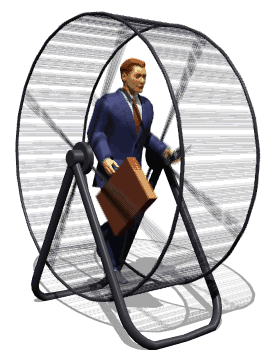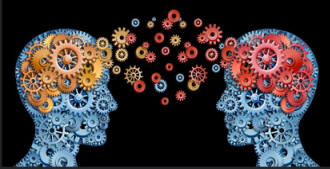We humans have been trying to invent a better mousetrap even before Mickey and Minnie Mouse came on the scene.
Not to cast aspersions on the Mouse Family, but our aversion to mouse poop has not diminished over time. And the quest for the perfect mousetrap–ideally nonviolent–goes on.
As the blueprint for happiness has been available to us all since forever through Vedic teachings, is it not better to emulate it rather than question, belittle or ignore it?
“It’s a gift to be simple, it’s a gift to be free, ‘Tis the gift to come down where I ought to be; and when we find ourselves in the place just right, Twill be in the valley of Love and Delight.”
(From the song, “Simple Gifts,” by Joseph Brackett)

Mechanic:
“Unfortunately, we’ll have to rebuild the engine.
Counterintuitively, we behave as if we get bonus paychecks based on the level of complexity we create and follow in our lives.
The Fivefold Path (lays things out in a simplistic way that may trick our minds into assuming it is not particularly revolutionary. Well, it is not revolutionary—no more than happiness not followed by unhappiness is.
It is simple, but not easy. After some time, it is simple to know how to behave. Easy to follow?–hardly. But then we were never promised a rose garden.
But we can behave properly—and take time to smell the roses.
And so it is. Moment to moment we progress or regress or digress or otherwise meander through the brambles of our minds.
So the MIND. Do we give it its due?
Thinking, willing and feeling somehow seems inadequate of a description.
While looking at the FP Mind Training Program, it is notable that much of the language seems to be geared or intended for alcoholics/addicts.
In the likely event that you would not label yourself an addict, two quite knowledgeable and influential teachers stated that ALL HUMANS ARE ADDICTS. So said Shree Vasant as well as the intuitive healer Carolyn Myss.
From our own experiences, let us examine this.
Have we any behaviours that may give short term pleasure, but that seem to work against our longer-term goals and aspirations?
Junk food may taste good, but does it contribute or detract from our health?
Eating late at night may help us fall asleep, but don’t we feel better in the morning without the midnight meal/snack?
As an exercise in increasing our understanding of how we are often being controlled by our minds—instead of vice versa—take your favorite, less than healthy food, and decide not to eat it for 90 days.
If, by the 5th (or 1st) day, you observe yourself on the way to the refrigerator at 2 a.m. to see if the ice cream is still there, stop for a moment before you indulge, and note how your mind is pulling you towards chocolate mint chip oblivion.
I had a client once whom I asked what his favorite food was. He answered that he did not have one. After a bit of investigation, it was learned that he had to have bread with every meal. Its absence made the meal impossible to partake in. Impossible.
Now this may be a little different than the ice cream compulsion, but it certainly has the hallmarks of dependence or shall we say, addictive type behaviour?
One way of looking at this is that left unchecked and unfettered, we may compare our minds to powerful horses whose energy can be controlled and focused or alternatively left to run wild and often amok.
Just as TRAINING is considered essential in many jobs and sports, so it is with our minds.

It has been said that we need to understand the nature of the mind and how we can gain control over it. The mind is like a tyrant, a dictator. It is oppressive. The mind, addicted to alcohol and or drugs has clearly become the master and we the servants.
Is Fivefold Path (FP) mystical? Well, when I began Agnihotra in 1976, I noticed that repeatedly my efforts to get to a restaurant late at night were thwarted—just barely. Faced with a closing time of 10 p.m., I kept getting to my destinations just a few minutes after closing time. This happened repeatedly and so often that I had to take a step back and analyze what felt like an unseen force protecting me from my own frailties.
If we may agree for now that we all have addictions—or at least behaviours that mimic them—let’s see how to lessen their effects.
Each of the 5 aspects of Fivefold Path (FP) contributes forcefully. They may act a bit differently, but in sum total, benefits accrue.
Experience, however, is the best teacher. So one might wish to focus on one (or two) habits that disturb your life, and monitor the results as you increase adherence to Fivefold Path elements.
This is a path to be LIVED, not just studied. Use your habits, predilections, addictions as data.
Compute the data, the costs and benefits of specific behaviours. Believe what you experience.
If, after a substantial amount of time, you find yourself not sufficiently satisfied with certain ways of acting, examine your practice of each of the steps of the FP.
If, e.g., you find yourself worrying too much about financial matters, try increasing your practice of Daan—sharing material assets humbly.
If you find yourself seemingly at the mercy of your habits—try as you may to break them—try engaging in some form of self-discipline.
What you select need not be directly related to the habit you are concentrating on. Doing a food tapa can effectively help one reduce anger, e.g. Control (or training) of the mind is increased through tapa, self-discipline, and this control can assist in many areas.
If you find yourself in a bit of a rut, perhaps not being entirely satisfied with your recent ‘accomplishments’ or service, consciousness and adherence to KARMA, the 4th step of Fivefold Path, can be not only helpful, but can increase our understanding of the law of ‘we reap as we sow.’
Then there is SWADHYAYA, self-study. It has been said the Swadhyaya is a 24-hour job. The opportunities for increased self-awareness, self-development and self-knowledge segue nicely with the self-control aspect of TAPA.
So it does not seem difficult or complicated, this endeavor of joy and responsibility. The wheel has been invented. Checking on, maintaining, and tweaking our physical, mental and spiritual selves are the air for our tires—which, after all, is where the rubber meets the road.
“Where the rubber meets the road”.


